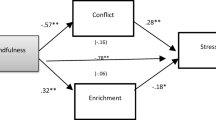Abstract
Objective
Maintenance of an academic focus is difficult for military residents transitioning into their first duty assignment.
Method
Building upon previous work on this subject, the authors present an updated and expanded junior faculty development model organized around seven overlapping domains: mentorship, scholarship, research, career planning, openness to experience, networking with other disciplines, and responsibility seeking. Using these seven domains as a platform for discussion, the authors focus on challenges facing early-career military psychiatrists and provide guidance based upon personal experience and limited applicable research.
Results
The authors believe that highly successful early-career psychiatrists wishing to maintain an academic focus possess a proactive attitude, obtain skillful mentoring, work well with others, and are able to adapt to new environments.
Conclusion
Through conscious planning and goal setting, they are able to capitalize on opportunities as they become available.
Similar content being viewed by others
References
Ritchie E, White R. Becoming a successful division psychiatrist: guidelines for preparation and duties of the assignment. Mil Med. 1993;158(10):644–8.
Hill J, Lange C, Bacon B. Becoming a successful division psychiatrist: the sequel. Mil Med. 2007;172(4):364–9.
Warner C, Appenzeller G, Barry M, Morton A, Grieger T. The evolving role of the division psychiatrist. Mil Med. 2007;172(9):918–24.
Warner C, Bobo W, Flynn J. Early career professional development issues for military academic psychiatrists. Acad Psychiatry. 2005;29:437–42.
Bono J, Judge T. Personality and transformational and transactional leadership: a meta-analysis. J Appl Psychol. 2004;89(5):901–10.
Judge T, Bono J, Ilies R, Gerhardt M. Personality and leadership: a qualitative and quantitative review. J Appl Psychol. 2002;87(4):765–80.
Demny T, Kivlahan C, Stone T, Teague L, Sapienza P. Physicians’ perceptions of insititutional and leadership factors influencing their job satisfaction at one academic medical center. Acad Med. 2002;77:1235–40.
Pololi L, Knight S, Dennis K, Frankel R. Helping medical school faculty realize their dreams: an innovative, collaborative mentoring program. Acad Med. 2002;77:377–84.
Chopra S, Sotile W, Sotile M. Physician Burnout. JAMA. 2004;291(5):633.
Seritan A, Bhangoo R, Garma S, DuBé J, Park J, Hales R. Society for Women in academic psychiatry: a peer mentoring approach. Acad Psychiatry. 2004;28(2):111–5.
Williams L, Levine J, Malhotra S, Holtzheimer P. The good-enough mentoring relationship. Acad Psychiatry. 1998;22(2):98–106.
Fox III E, Waldron J, Bohnert P, Hishinuma E, Nordquist C. Mentoring new faculty in a department of psychiatry. Acad Psychiatry. 2009;33(4):307–12.
Lis L, Wood W, Petkova E, Shatkin J. Mentoring in psychiatric residency programs: a survey of chief residents. Med Teach. 2005;27(8):693–8.
Leslie K, Lingard L, Whyte S. Junior faculty experiences with informal mentoring. Med Teach. 2005;8:693–8.
Balmer D, D'Alessandro D, Risko W, Gusic M. How mentoring relationships evolve: a longitudinal study of academic pediatricians in a physician educator faculty development program. J Contin Educ Health Prof. 2011;31(2):81–6.
Disclosures
The authors have declared that no competing interests exist. No funding was obtained in the authorship of this manuscript. This manuscript received PAO clearance prior to publication.
Author information
Authors and Affiliations
Corresponding author
Rights and permissions
About this article
Cite this article
Schnitzlein, C.W., Lee, D.J., Wise, J.E. et al. Both Feet In: Maintaining an Academic Focus During the Transition from Residency to a First Military Assignment. Acad Psychiatry 39, 372–375 (2015). https://doi.org/10.1007/s40596-015-0369-y
Received:
Accepted:
Published:
Issue Date:
DOI: https://doi.org/10.1007/s40596-015-0369-y




